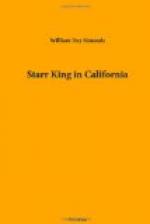From this brief review it is evident that when Starr King preached his last sermon in Boston, March 25, 1860, he had made for himself an enviable reputation in three difficult fields of work, as preacher, lecturer and writer. The feeling of Boston and New England upon his departure was fittingly expressed by Edwin Percy Whipple in a leading journal of the day in which this eminent author “appealed to thousands in proof of the assertion that though in charge of a large parish, and with a lecture parish which extended from Bangor to St. Louis, he still seemed to have time for every noble work, to be open to every demand of misfortune, tender to every pretension of weakness, responsive to every call of sympathy, and true to every obligation of friendship; all will indulge the hope that California, cordial as must be the welcome she extends him, will still not be able to keep him long from Massachusetts.”
On the day before he sailed from New York a “Breakfast Reception” was given him at the Fifth Avenue Hotel, at which three hundred guests were seated at the tables. The poet, William Cullen Bryant presided, and other men hardly less distinguished testified to the nature of King’s work, and to the varied charm of his unique personality. Best of all, perhaps, was the tribute of his friend and neighbor, Dr. Frederick H. Hedge. “Happy Soul! himself a benediction wherever he goes; a living evangel of kind affections, better than all prophecy and all knowledge, the Angel of the Church whom Boston sends to San Francisco.”
Such was the man who came to California in the greatest crisis of her history to exert upon her destiny an influence unequalled and unexampled even in that most romantic and eventful story of the Golden West.
The federal census of 1860 gave California 379,984 inhabitants and San Francisco 56,802. Historian Bancroft informs us that here was “a gathering without a parallel in history.” It may be said that the whole history and development of California is without parallel. The story reads not so much like the orderly growth of a civilized community as a series of unrelated and episodical events. There is little of logical order or sequence, and much of surprise, adventure, of conflict and crisis. Said an aged philosopher, “It is the unexpected that happens,” a saying illustrated if anywhere in the world, in the history of the Golden State.
Although discovered early in the sixteenth century by adventurous Spaniards, no serious attempt was made at settlement of any portion of the territory now included in the boundaries of California until the year 1769, when Father Junipero Serra arrived at the Bay of San Diego. Then followed a half century constituting the Mission Period of California history, during which Spanish Governors and Franciscan Friars ruled the land. Inspired more by religious zeal than by lust of conquest, or hope of gain, the Spanish




